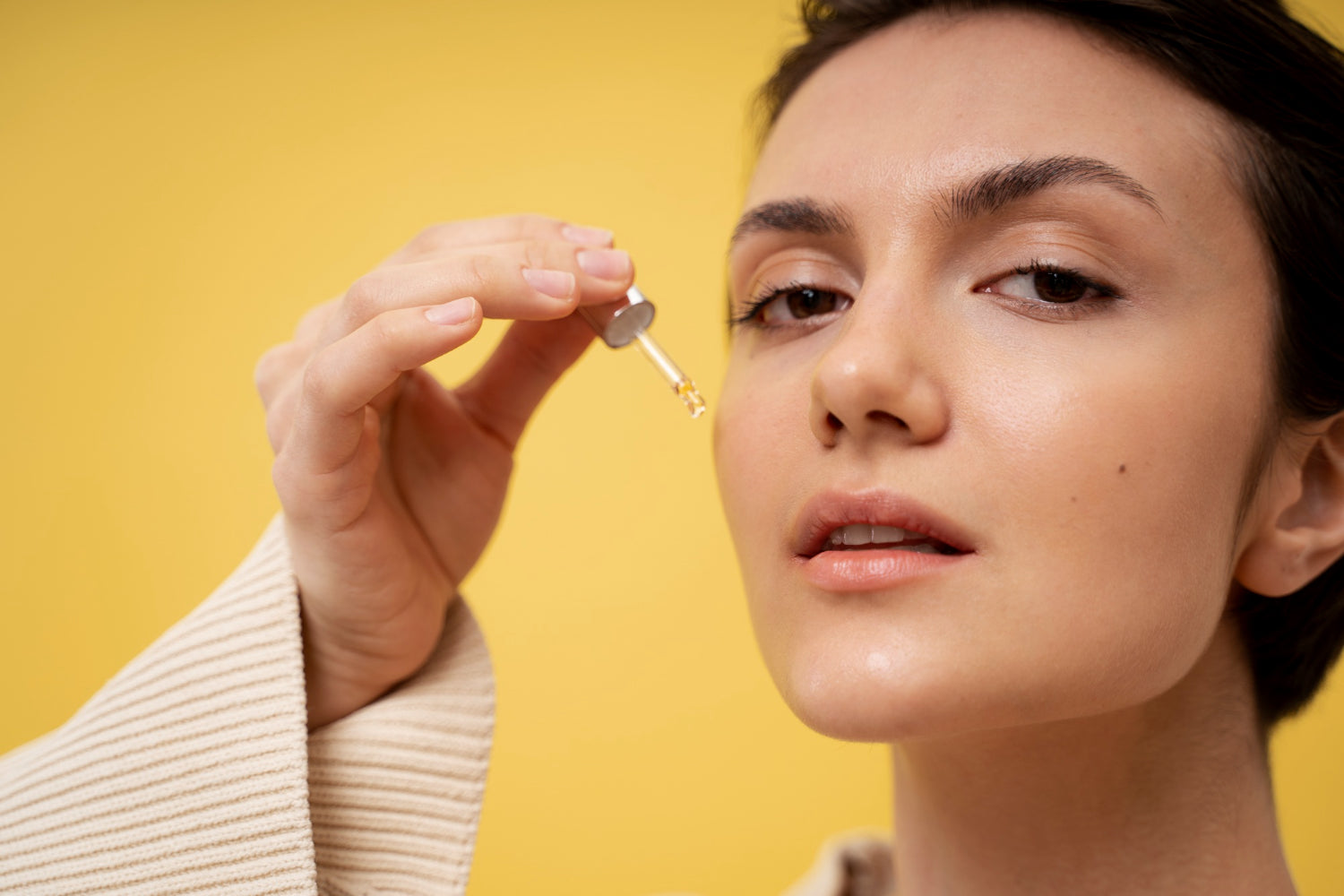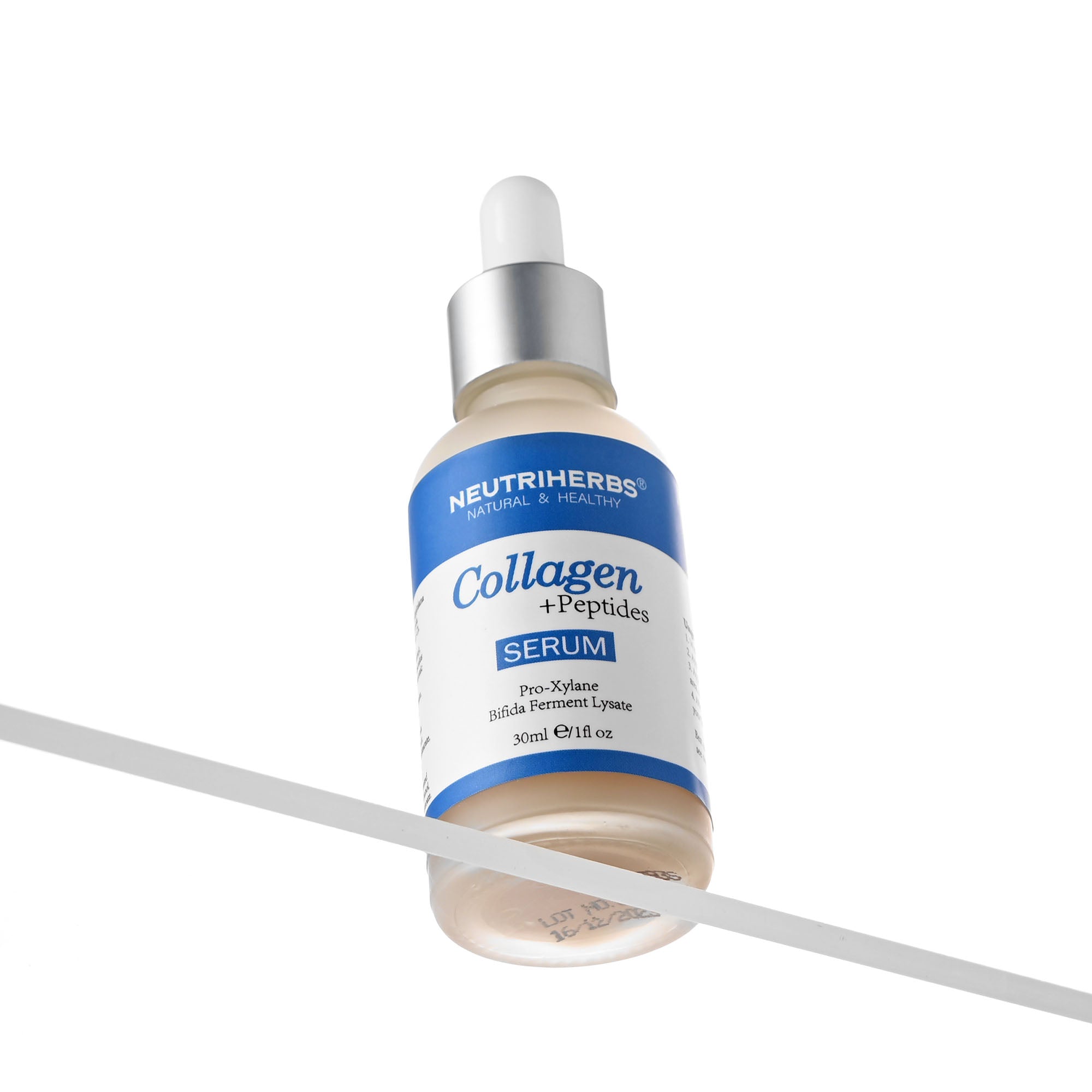Vitamin C is a popular ingredient in skincare products. But what are the benefits? In this article, I will share some of the fantastic effects of vitamin C on your skin. Combining sunscreen with vitamin C may increase the skin's resistance to sun damage by up to 8 times.
The benefits of vitamin C in your skincare line are:
- Brighten your skin and fade dark spots
- Reduce the appearance of wrinkles and fine lines
- Protect your skin from sun damage and free radicals
- Improve your skin texture and tone by enhancing hydration and elasticity
You should read on if you want to learn more about vitamin C and how it may benefit your skin. In the following sections, I will explain how to use vitamin C products correctly, store them properly, and avoid common mistakes and side effects.
What is Vitamin C and Why is it Good for Your Skin?
According to my research, vitamin C, or ascorbic acid, is a vital nutrient with numerous health benefits. It plays a crucial role in supporting the immune system and helping the body fight infections and illnesses. Additionally, vitamin C is essential for producing collagen, a protein that aids in maintaining healthy skin, blood vessels, and connective tissues. This antioxidant vitamin also helps protect cells from damage caused by free radicals, reducing the risk of chronic diseases and promoting overall well-being. Citrus fruits, strawberries, broccoli, and bell peppers are rich sources of vitamin C, and their inclusion in the diet contributes to a robust immune system and vibrant skin.
As a skincare professional, I will tell you vitamin C is a powerful antioxidant that may protect your skin from free radicals and harmful molecules that may damage your skin cells and cause signs of aging, such as sagging, dark spots, and wrinkles. Learn different types of wrinkles here. Free radicals may come from sun exposure, pollution, smoking, and stress. Applying vitamin C to your skin may help neutralize these free radicals and prevent them from harming your skin.

Benefits of Vitamin C for Your Skin
I believe that vitamin C for skin products may have various benefits for your health, such as:
- Boosting collagen production:
Collagen is a protein that gives skin structure and elasticity. As you age, your collagen levels decrease, leading to a loss of firmness and smoothness. Vitamin C may stimulate your skin to produce more collagen, which may improve the appearance of fine lines and wrinkles. Find 7 ways to increase skin collagen production here.
- Reducing hyperpigmentation:
Hyperpigmentation is a condition where some areas of your skin become darker than others due to excess melanin production. Melanin is the pigment that gives your skin color. Vitamin C may inhibit the enzyme that makes melanin, called tyrosinase, and help fade dark spots and even your skin tone.
- Enhancing sun protection:
Vitamin C may work with your sunscreen to provide better protection from UV rays, which may cause sunburn, premature aging, and skin cancer. Vitamin C may reduce the amount of sun damage your skin receives and also help repair the damage that has already occurred.
Check out our best selection of vitamin C sunscreen here.
- Promoting wound healing:
- Improving hydration:
Vitamin C may help your skin retain moisture by increasing the production of hyaluronic acid, which attracts and holds water in your skin. Hyaluronic acid may also plump up your skin and smooth out fine lines.
To enjoy these benefits, you must use topical vitamin C products, such as serums, creams, or oils, that contain an active form of vitamin C, such as L-ascorbic acid. You also need to choose a product with a concentration of 10% to 20% vitamin C and a pH lower than 3.5, as these are the optimal conditions for vitamin C to penetrate your skin and work effectively. You may apply vitamin C products once or twice a day, preferably in the morning, after cleansing and moisturizing your skin. You should also store your vitamin C products in a cool, dark place, as vitamin C may degrade when exposed to light, heat, and air. Learn 5 reasons why you should add vitamin C to your skin.
How Vitamin C Boosts Collagen Production and Reduces Signs of Aging
I will tell you one of the main secret advantages of vitamin C for your skin is that it boosts collagen production and reduces signs of aging. Collagen is a protein that supports the structure and elasticity of your skin, but it declines as you age, leading to wrinkles, sagging, and loss of firmness. Vitamin C may help prevent and reverse these signs of aging by stimulating collagen synthesis and preventing collagen breakdown.
Vitamin C stimulates collagen synthesis by activating the enzymes that are involved in the process of making collagen. Vitamin C also acts as a co-factor for the enzymes that hydroxylate proline and lysine, which are amino acids that are essential for the stability and cross-linking of collagen fibers. By increasing the amount and quality of collagen in your skin, vitamin C may improve your skin's firmness, smoothness, and elasticity.
Vitamin C prevents collagen breakdown by protecting your skin from free radical damage and inflammation caused by sun exposure, pollution, and other environmental factors.
Free radicals are unstable molecules that may damage skin cells and collagen fibers, leading to premature aging and skin diseases.
Vitamin C is a powerful antioxidant that may neutralize free radicals and reduce oxidative stress in your skin. Vitamin C may also reduce the production of inflammatory cytokines, which are molecules that trigger inflammation and degrade collagen.
By reducing free radical damage and inflammation in your skin, vitamin C may preserve your collagen and prevent wrinkles, sagging, and loss of firmness. Learn how to choose anti-aging skin care products here.

How Vitamin C Fights Free Radicals and Protects Your Skin from Sun Damage
I will share another advantage of vitamin C for your skin that it fights free radicals and protects it from sun damage. Free radicals are unstable molecules that may damage skin cells and collagen fibers, leading to premature aging and skin diseases. Sun exposure is one of the primary sources of free radicals, as the ultraviolet (UV) rays may generate reactive oxygen species (ROS) in your skin. Vitamin C is a powerful antioxidant that may neutralize free radicals and reactive oxygen species (ROS) and reduce oxidative stress in your skin. Vitamin C may also prevent and repair the damage caused by UV rays, such as sunburn, inflammation, pigmentation, and skin cancer.
Vitamin C fights free radicals by donating electrons to them, making them more stable and less harmful. Vitamin C may also regenerate other antioxidants, such as vitamin E and glutathione, which work together to protect your skin from oxidative stress. Vitamin C may also modulate the expression of genes that are involved in the antioxidant defense system, such as superoxide dismutase (SOD), catalase, and glutathione peroxidase (GPx). By enhancing the antioxidant capacity of your skin, vitamin C may prevent and reduce the signs of aging, such as wrinkles, sagging, and loss of firmness.
Vitamin C protects your skin from sun damage by reducing the production of melanin, the pigment that gives your skin color. UV rays stimulate melanocytes to produce melanin. Excessive melanin production may lead to dark spots, hyperpigmentation, and uneven skin tone. Vitamin C may inhibit the enzyme that produces melanin, called tyrosinase, and reduce the amount of melanin in your skin. Find 7 reasons why vitamin C is good for your skin here.

Vitamin C may also increase the expression of p53, a protein that regulates the cell cycle and prevents Deoxyribonucleic acid (DNA) damage and mutation caused by UV rays. Vitamin C may decrease the production of inflammatory cytokines, such as interleukin-1 (IL-1), tumor necrosis factor-alpha (TNF-alpha), and prostaglandin E2 (PGE2), which are triggered by UV rays and may cause inflammation, redness, and pain in your skin. Vitamin C may protect your skin from sun damage and enhance skin tone and texture by reducing melanin production, preventing DNA damage, and decreasing inflammation.
Find our best selection of vitamin C products here.
How Vitamin C Brightens Your Complexion and Evens Out Your Skin Tone
I want to tell you one of the advantages of vitamin C for your skin is that it brightens your complexion and evens your skin tone. Vitamin C may help you achieve radiant and flawless skin by reducing the appearance of dark spots, hyperpigmentation, and uneven skin tone. Vitamin C may also enhance your skin's natural glow and luminosity by improving your skin's hydration and moisture.
According to my research vitamin C brightens your complexion and evens your skin tone by reducing the production of melanin, the pigment that gives your skin color. Melanin is produced by melanocytes, stimulated by various factors, such as sun exposure, hormones, inflammation, and skin damage. Excessive melanin production may lead to dark spots, hyperpigmentation, and uneven skin tone, making your skin look dull and aged. Vitamin C may inhibit the enzyme that produces melanin, called tyrosinase, and reduce the amount of melanin in your skin. Vitamin C may also interfere with the transfer of melanin from melanocytes to keratinocytes, cells that form the outer layer of your skin. By reducing melanin production and transfer, vitamin C may lighten and brighten your skin and fade away dark spots, hyperpigmentation, and uneven skin tone. Learn how to build vitamin C into your skincare regimen here.
Vitamin C enhances your skin's natural glow and luminosity by improving your skin's hydration and moisture. Vitamin C helps your skin retain water and prevents transepidermal water loss, which is water evaporation from the skin's surface. Vitamin C may also increase the production of ceramides, lipids that form a protective barrier on your skin. By increasing the water content and barrier function of your skin, vitamin C may keep your skin hydrated and moisturized, which may improve your skin's texture and smoothness. Vitamin C may also reflect light from your skin, which may make your skin look more radiant and luminous.

How to Choose the Right Vitamin C Product for Your Skin Type and Concerns
As an expert in skincare, I would like to share some tips on choosing the right vitamin C product for your skin type and concerns. Vitamin C is a powerful antioxidant that may help protect your skin from free radical damage, boost collagen production, brighten your complexion, and reduce the appearance of fine lines and wrinkles. Vitamin C products come in different forms, concentrations, and formulations, which may affect their effectiveness, stability, and compatibility with your skin. However, not all vitamin C products are created equal. Here are some factors to consider when selecting a vitamin C serum for your skin:
- Form:
Vitamin C may exist in different forms, such as L-ascorbic acid, magnesium ascorbyl phosphate, sodium ascorbyl phosphate, ascorbic palmitate, and retinyl ascorbate. L-ascorbic acid is the most potent and stable form of vitamin C, but it may also be more irritating and unstable at high concentrations. For oily or normal skin types, L-ascorbic acid may be suitable. Find how to know skin types here. Magnesium ascorbyl phosphate may be a gentler option for dry or sensitive skin types, as it is water-soluble and less likely to cause irritation or sensitivity. Sodium ascorbyl phosphate is another water-soluble form that may penetrate the skin well without irritating it. Ascorbic palmitate is a fat-soluble form that may provide longer-lasting hydration and protection for dry or mature skin types. Retinyl ascorbate is a combination of vitamin C and retinol (a form of vitamin A) that may enhance the effectiveness of both ingredients for improving skin texture, tone, and elasticity. Find how vitamin C benefits your skin here.
- Choose the right concentration of vitamin C.
Vitamin C products may range from 5% to 30% in concentration, depending on the form and formulation. The higher the concentration, the more effective and potent the product and the more irritating and unstable it may be. The optimal concentration of vitamin C for your skin depends on your skin type, concerns, and tolerance. Generally, a 10% to 20% concentration is considered effective and safe for most skin types and concerns. However, if you have sensitive or dry skin, start with a lower concentration, 5% to 10%, and gradually increase it as your skin adapts. If you have oily or acne-prone skin, use a higher concentration of 15% to 30% to achieve better results.
- Potential of Hydrogen (pH):
The potential of hydrogen (pH) level of a serum refers to how acidic or alkaline it is. The optimal pH range for vitamin C serums is between 2.0 and 3.5, which means they are slightly acidic. This helps preserve the stability and potency of vitamin C in the product. If you use a too-alkaline serum (above 7), it may degrade over time and lose its effectiveness. If you use a too acidic serum (below 2), it may irritate your skin or cause redness or burning sensations.
- Formulation:
Vitamin C products may come in different formulations, such as serums, creams, masks, and sprays. The formulation may affect the delivery, absorption, and stability of vitamin C in your skin. Generally, serums are the most effective and popular formulation of vitamin C, as they may deliver a high concentration of vitamin C in a lightweight and fast-absorbing texture.
However, serums may also be the most unstable and prone to oxidation, especially if they are water-based and contain L-ascorbic acid. To prevent oxidation, you should look for serums packaged in dark, opaque, and airless bottles and store them in a cool and dry place.
It would help if you also look for serums that contain other ingredients that may enhance the benefits and stability of vitamin C, such as hyaluronic acid, ferulic acid, and vitamin E. Creams are another common formulation of vitamin C, which may provide a rich and nourishing texture for dry and mature skin.
However, creams may also be less effective and penetrating than serums, especially if they contain a lower concentration of vitamin C or a less potent form of vitamin C.
Masks are another option for vitamin C, which may provide a refreshing and revitalizing effect for oily and combination skin. However, masks may also be less consistent and convenient than serums or creams, requiring more time and frequency.
Sprays are another alternative for vitamin C, which may provide a quick and easy application for all skin types. However, sprays may not be as concentrated or targeted as serums or creams due to potential dilution by water or other ingredients.

- Other ingredients:
Besides vitamin C, other ingredients may enhance its benefits or address specific skin concerns. For example:
Ferulic acid:
This is another antioxidant that works synergistically with vitamin C to boost its efficacy and stability in the product. It also helps protect against environmental damage and sun exposure.
Vitamin E:
This is another antioxidant that helps moisturize and nourish the skin while preventing oxidation of vitamin C in the product. It also helps improve skin barrier function and reduce inflammation.
Hyaluronic acid:
This humectant attracts moisture from the air into the skin while retaining it within the product. It helps plump up dry areas of the face while smoothing out fine lines and wrinkles.
Niacinamide:
This form of vitamin B3 helps brighten even skin tone while reducing hyperpigmentation caused by sun damage or acne scars. It also helps improve skin texture by reducing excess oil production and promoting cell turnover.
Glycolic acid:
This alpha-hydroxy acid (AHA) exfoliates dead skin cells from the surface while stimulating collagen production in deeper layers of the product. It helps improve skin clarity by removing dullness caused by impurities or environmental factors.
As you may see, there are many factors to consider when choosing a vitamin C product for your skin type and concerns. To help you make an informed decision, I recommend visiting Nutrihub, where you may find detailed information about each ingredient’s benefits, safety profile, dosage recommendations, and potential interactions with others.
Find our Top collection of vitamin C products here.
How to Incorporate Vitamin C into Your Daily Skincare Routine
If you want to incorporate vitamin C into your daily skincare routine, follow some simple steps to ensure the best results and avoid adverse reactions. Vitamin C products may be used twice daily depending on skin type, concerns, and preferences. Here are some tips that I share with you for incorporating vitamin C into your daily skincare routine:
- In the morning, you may use vitamin C products to protect your skin from sun damage and environmental stressors, as well as to brighten your complexion and even out your skin tone. You should apply vitamin C products after cleansing and toning your skin before applying moisturizer and sunscreen. It would help to use sunscreen with at least SPF 30 to prevent any sun sensitivity caused by vitamin C. You may choose from our Nutrihub vitamin C products, such as our Nutrihub Vitamin C Serum, which contains 20% L-ascorbic acid, the most potent and stable form of vitamin C. It also contains hyaluronic acid, ferulic acid, and vitamin E, which enhance the benefits and stability of vitamin C. This serum may penetrate deep into your skin and provide powerful antioxidant protection, collagen stimulation, and brightening. It is suitable for all skin types and may be used daily in the morning and evening.
- In the evening, you may use vitamin C products to repair your skin from the damage caused by sun exposure, pollution, and other environmental factors, as well as to boost your collagen production and reduce your signs of aging. You should apply vitamin C products after cleansing and toning your skin before applying moisturizer and night cream. You may choose from our Nutrihub vitamin C products, such as our Nutrihub Vitamin C Cream, which contains 10% L-ascorbic acid, shea butter, jojoba oil, and aloe vera. It may moisturize, soften, and smooth your skin while providing antioxidant, anti-aging, and anti-inflammatory benefits. It is ideal for dry and mature skin and may be used daily in the morning and evening.
- Once or twice a week, you may use vitamin C products to exfoliate and brighten your skin and reduce your pores, blemishes, and redness. After cleansing and toning your skin, you should apply vitamin C products and leave them on for 10 to 15 minutes before rinsing them off with water. You may choose from our Nutrihub vitamin C products, such as our Nutrihub Vitamin C Mask, which contains 5% L-ascorbic acid and kaolin clay, green tea extract, and cucumber extract. It may cleanse, exfoliate, and brighten your skin, reducing pores, blemishes, and redness. It is suitable for oily and combination skin and may be used once or twice weekly for 10 to 15 minutes.

The Best Vitamin C Products to Try from Our Skincare Line
You are in the right place if you are looking for the best vitamin C products from our skincare line. We have a range of vitamin C products specially formulated with the best ingredients and technology to deliver effective and lasting results for your skin. Whether you want to protect, repair, or brighten your skin, we have a product that suits your needs and preferences. Find 8 secrets you should know before applying your first Vitamin C serum here. Here are some of the best vitamin C products to try from our skincare line:
- Neutriherbs Vitamin C Serum:
This is our best-selling product and for a good reason. It contains 20% vitamin C, which is a high concentration that may deliver visible results in a short time. It also has hyaluronic acid, which may hydrate and plump your skin, and niacinamide, which may reduce inflammation and redness. This serum may help fade dark spots, improve skin texture, and boost collagen production. You may use it every morning and night after cleansing and toning your skin and before applying your moisturizer.

- Neutriherbs Vitamin C Brightening & Glow Cream:
This rich and nourishing cream may moisturize and brighten your skin. It has vitamin C, shea butter, jojoba oil, and sunflower seed oil, which may provide your skin with essential fatty acids, antioxidants, and vitamins. This cream may help you smooth out fine lines, even skin tone, and restore your skin's natural glow. After applying your serum, you may use it every morning and night and massage it gently into your skin.

- Neutriherbs Vitamin C Brightening & Glow Facial Mask:
This sheet mask may give your skin an instant boost of radiance and hydration. It has vitamin C, licorice root extract, and aloe vera, which may soothe and brighten your skin. This mask may help reduce dullness, calm irritation, and enhance skin elasticity. You may use it once or twice a week after cleansing and toning your skin, leaving it on for 15 to 20 minutes, then removing it and patting the remaining essence into your skin.

- Neutriherbs Vitamin C Brightening & Glow Eye Gel:
This lightweight and refreshing gel may target the delicate skin around your eyes. It has vitamin C, caffeine, and cucumber extract, which may depuff and brighten your eye area. This gel may help diminish dark circles, reduce puffiness, and smooth out crow's feet. You may use it every morning and night after applying your cream and gently tap it around your eyes with your ring finger.

These are some of the best vitamin C products I shared to try from our skincare line. They are all made with natural and safe ingredients and are suitable for all skin types. Regular and consistent use may help you achieve more youthful, radiant, and healthy skin. If you have any questions or feedback, please get in touch with us. Learn the 6 biggest skincare myths about vitamin C here.
Conclusion
Vitamin C is a powerful antioxidant that improves skin health and appearance. Whether you choose a serum, a cream, or a mask, incorporating vitamin C into your skincare line may benefit your customers and your business. How will you use vitamin C to create your unique products?



